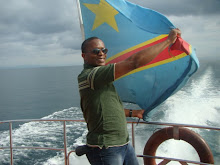
My friend Kizito must have read the disappointment on my face. He suggested we visit a medical center that was unknown to most visitors, called GESOM. This Health center focuses its work on three major areas: medical treatment, psychological treatment, and social reinsertion. There, we met with Nurse Director Mwarabu Mungazi, who gave us a quick tour of the section devoted to caring for sexual violence survivors.
GESOM is very small and does not, even to a non-medical eye, meet conditions conducive to quick recovery of the patients. The four of five patients’ rooms were not well lit. Nurse Mwarabu said the center receives funds from PNUD, UNFPA, the Canadian government and Medical Mundi. I wondered if these international organizations and foreign governments are perhaps not giving GESOM enough to allow it to expand, or if the center is just not using the funds accordingly.
In one of the rooms, we saw a female patient called Nyirandikubwimana Niyonsaba, which is not a typical Congolese name. I found out later that she was a Hutu from neighboring Rwanda. Her story was heartbreaking. Six years ago, she was gang raped and her entire family was killed. She suffered severe burns to her harms and legs as she tried to escape her village that was being burnt down by assailant militia men Since then, her wounds have not healed completely. Everytime she was released from the hospital, her wounds became infected.
The look in her eyes also told a lot about her inner wounds. Chances are, the wounds on her arms and legs are curable, but who will ever cure the invisible ones she suffered deep inside herself? Who did this to this young woman? How many Nyirandikubwimana Niyonsabas are there out there, silently suffering in barely accessible places in the Congo? How many Nyirandikubwimana Niyonsabas will there be before the International Community decides to take appropriate measures to stop the madness going on in Eastern Congo, that is a clear result of conflict spilling over from Rwanda and Uganda?
These thoughts followed me to our later meeting with Justine of the Synergie des Femmes pour les Victimes des Violences Sexuelles (SFVS). Justine is in her mid-forties. Along with women leaders from thirty-five other organizations, she decided to create SFVS in 2002 to fight the rampant sexual violence committed against women and girls throughout North Kivu province. Justine said that SFVS was founded once it became clear that rape was being used as a weapon of war, causing not only unwanted pregnancies, STDs, HIV/AIDs, fistulas and other health problems, but the dislocation of communities.
SFVS does not limit its actions to simple denunciation of sexual violence. Sometimes, they have taken to the streets when justice seemed to lag behind, or when justice failed to deliver. United in a group called “Sauti Ya Mama Mkongomani,” (translated as Voice of the Congolese Woman) the women of SFVS have, in the past, sent delegations to Kinshasa, Kigali and Kampala to persuade leaders in these capitals to find peaceful solutions to problems in eastern Congo. As Justine was explaining the work her organization does to assist women in the region, I pictured her playing a leading role, as did Leymah Gbowee when she galvanized and mobilized the Liberian women’s movement.
In spite of the many unfulfilled promises they have heard from several visitors in the past, the people at GESOM, as well as Justine, embraced the idea of partnering with us. It was so encouraging to see their enthusiasm.

No comments:
Post a Comment